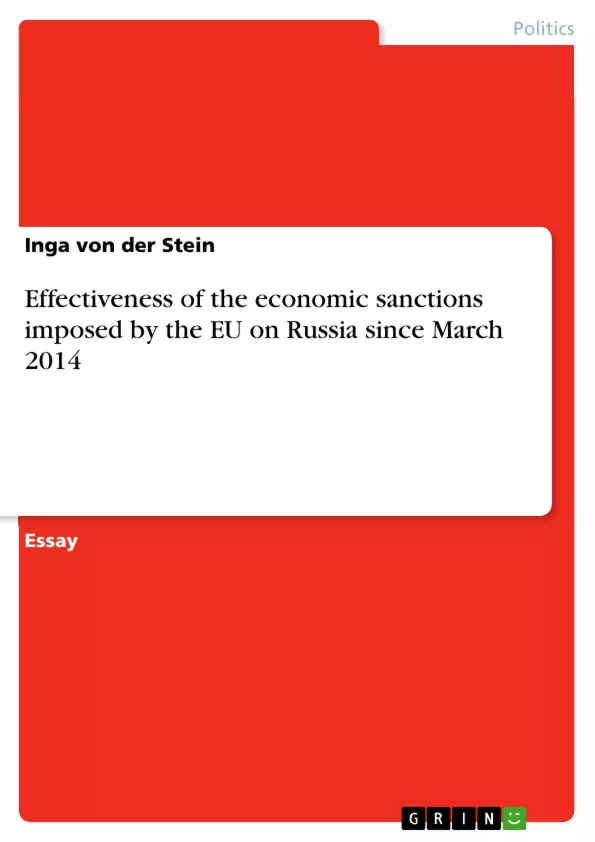The debate about the effectiveness of sanctions is not new, but was started at a high political level by the United States’ (US) President Wilson in 1919, when he discussed the utility of sanctions as a foreign policy (FP) instrument which he viewed as an alternative to war. Almost a century later, the debate about the effectiveness of sanctions still lives on.
While the US has been a frequent sender of sanctions since WWI, the European Union (EU) has emerged as a new sender of sanctions on the international stage since the 1990s. For this paper, the sanctions imposed by the EU on the Russian Federation (Russia) starting in March 2014 were selected as a case study to investigate the effectiveness of sanctions.
This paper applies the framework developed by Hufbauer to analyse the effectiveness of sanctions, which points out that their effectiveness depends on the extent to which the policy objectives by the sender were achieved and the contribution to success that was made by the sanctions. To explain the influence of sanctions on Russia, special emphasis is laid on the political character of the target’s country’s government, which is one of the political variables outlined by Hufbauer.
Inhaltsverzeichnis (Table of Contents)
- INTRODUCTION
- BACKGROUND
- METHDOLOGY
- CASE SELECTION
- ANALYSIS
- First round of sanctions.
- Second round of sanctions
- Third round of sanctions
- The political nature of the target country's government
- CONCLUSION
- REFERENCES
Zielsetzung und Themenschwerpunkte (Objectives and Key Themes)
This paper examines the effectiveness of the economic sanctions imposed by the European Union (EU) on the Russian Federation (Russia) starting in March 2014, applying the framework developed by Hufbauer et al. (2007a). It seeks to assess the extent to which the EU's policy objectives were achieved and the contribution of the sanctions to that success. The paper places particular emphasis on the political nature of the target country's government, as outlined by Hufbauer et al. (2007a), to understand its influence on the sanctions' effectiveness.
- The effectiveness of economic sanctions as a foreign policy instrument.
- The impact of the EU's sanctions on Russia's political and economic landscape.
- The role of the target country's government in determining the effectiveness of sanctions.
- The limitations and challenges associated with economic sanctions.
- The EU's role as a normative actor in the field of international sanctions.
Zusammenfassung der Kapitel (Chapter Summaries)
- INTRODUCTION: The paper introduces the ongoing debate about the effectiveness of economic sanctions, focusing on the EU's sanctions on Russia since 2014 as a case study. It outlines the methodology and hypothesis, emphasizing the significance of the target country's political regime.
- BACKGROUND: This chapter provides a comprehensive overview of economic sanctions, drawing upon the influential work of Hufbauer et al. (2007a). It defines sanctions, explores different types, and discusses their limitations and the ongoing debate surrounding their effectiveness.
- METHDOLOGY: The chapter details the methodology used to assess the effectiveness of the EU sanctions, focusing on Hufbauer et al.'s (2007a) framework which analyzes the extent to which policy objectives were achieved and the sanctions' contribution to that success. It also incorporates Fischer's (2017) division of sanctions' intentions (coercing, convincing, and signaling).
- CASE SELECTION: This chapter highlights the EU's distinctive role in the field of sanctions and focuses on the EU sanctions on Russia as a specific case study. It emphasizes the EU's self-conception as a normative actor, as reflected in its official definition of sanctions policy.
Schlüsselwörter (Keywords)
Economic sanctions, European Union, Russia, foreign policy, effectiveness, political regime, policy objectives, sanctions contribution, targeted sanctions, normative actor, case study.
Frequently Asked Questions
What is the main focus of this study on EU sanctions?
The paper investigates the effectiveness of economic sanctions imposed by the European Union on Russia since March 2014, using the Hufbauer framework for analysis.
Which framework is used to assess the effectiveness of the sanctions?
The study applies the framework developed by Hufbauer et al. (2007), which evaluates effectiveness based on policy objective achievement and the sanctions' specific contribution to that success.
How does the political nature of Russia's government affect the sanctions?
The paper emphasizes that the political character of the target country's government is a crucial variable in determining whether sanctions will successfully influence its behavior.
What are the three categories of intentions for sanctions mentioned?
Based on Fischer's (2017) methodology, the paper looks at sanctions intended for coercing, convincing, and signaling.
What is meant by the EU as a "normative actor" in sanctions policy?
It refers to the EU's self-conception as an actor that uses sanctions to uphold international norms and values, rather than just pursuing narrow strategic interests.
- Citar trabajo
- Inga von der Stein (Autor), 2017, Effectiveness of the economic sanctions imposed by the EU on Russia since March 2014, Múnich, GRIN Verlag, https://www.grin.com/document/386968



